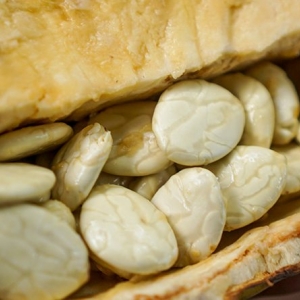Macambo Beans (roasted)
Theobroma bicolor
Macambo, also known in Brazil as Peruvian Cacao, is a close relative of Cacao and Cupuaçu. Toasted Macambo beans are 25% protein, an incredible 31% fiber and rich in healthy fatty acids. For generations Amazonian locals have cooked the seeds for breakfast, and with good reason as the Macambo beans provide sustained energy for long hard work days in the brutal equatorial heat. For those seeking a healthy lifestyle, Macambo beans make for a perfect meal replacement snack as well as an all-day-energy source for endurance athletes. Macambo is a permaculture superstar, with each aspect of the tree being extremely useful. The roots build soil, the flavorful white pulp of the fruit is great for juice and fermentation and the shells can be used for everything from making tableware to cooking or as mulch. Wild Macambo trees can be seen among the canopy of the Amazon rainforest, because of its native status in the rainforest, this hardy tree can be used to quickly restore degraded lands with minimal maintenance.
Macambo (Theobroma bicolor) is a medium sized native tree, common in Western Amazonia. The Macambo fruit is a yellow pod, shaped and sized just like a football (American). Each pod has a hard woody shell, when opened a sweet aromatic white pulp and unusually large (5-7cm) and intricate beans are exposed.
The large fruit pods of the Macambo tree are opened and the pulp and beans carefully removed. Similar to Cacao, the beans and pulp are fermented in large boxes for approximately three days. After fermentation, the beans are then gently roasted in a rotary dehydrator at 200°F. Once a perfect level of crunchiness is obtained, the select highest quality beans are ready for packaging.

